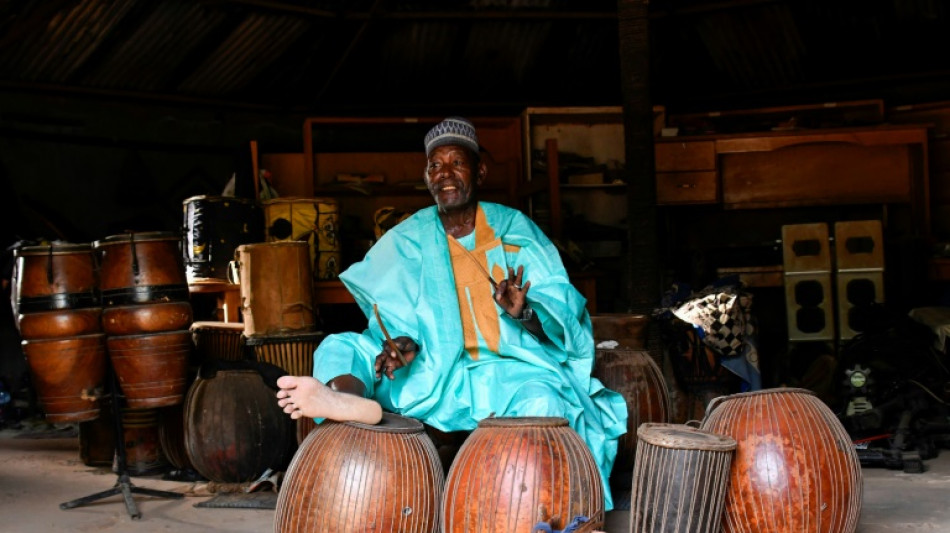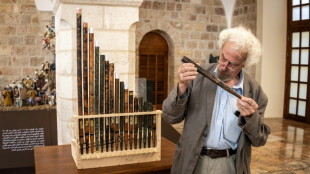
-
 Wallabies throw rookie Edmed into Argentina cauldron
Wallabies throw rookie Edmed into Argentina cauldron
-
Israel intercepts missile fired from Yemen after deadly Sanaa strikes

-
 France political crisis looms over ECB meeting
France political crisis looms over ECB meeting
-
Against the tide: Filipinos battle rising sea on sinking island

-
 Silent for 800 years, medieval organ sings again in Jerusalem
Silent for 800 years, medieval organ sings again in Jerusalem
-
Canoe-kayak champion Fox out of worlds after kidney surgery

-
 DuPlantis excited to be back in Tokyo after 'apocalyptic' Olympics
DuPlantis excited to be back in Tokyo after 'apocalyptic' Olympics
-
Bolt backs Jamaicans to trump Lyles in world 100m

-
 Hong Kong LGBTQ rights setback takes emotional toll
Hong Kong LGBTQ rights setback takes emotional toll
-
'Extremely quick' wing Carter handed All Blacks debut against Springboks

-
 French lawmakers urge 'digital curfew' for teens
French lawmakers urge 'digital curfew' for teens
-
Markets mostly up as US producer price data stokes rate cut bets

-
 Heat risks force world marathons and race walks to start earlier
Heat risks force world marathons and race walks to start earlier
-
S. Korea says 'bewildering' immigration raid could chill investment

-
 Australian authorities investigate influencer over croc wrestling
Australian authorities investigate influencer over croc wrestling
-
After protests oust PM, Nepal stares into political void

-
 Soured rivalry: India v Pakistan as 'brothers' clash for world gold
Soured rivalry: India v Pakistan as 'brothers' clash for world gold
-
Trump blasts 'radical left' after killing of influencer Charlie Kirk

-
 'Minimalist' Ralph Lauren designs kick off New York Fashion Week
'Minimalist' Ralph Lauren designs kick off New York Fashion Week
-
'Exciting' wing Carter handed All Blacks debut against Springboks

-
 2-1: First not-guilty vote in Bolsonaro coup trial, two to go
2-1: First not-guilty vote in Bolsonaro coup trial, two to go
-
Informing parents not enough to fight childhood obesity: study

-
 Israel film debuts in Toronto after festival uncertainty
Israel film debuts in Toronto after festival uncertainty
-
South Africa beat England by 14 runs in rain-marred 1st T20

-
 Under US pressure, Mexico mulling 50% tariff on Chinese cars
Under US pressure, Mexico mulling 50% tariff on Chinese cars
-
S&P 500 ends at record as markets await key US consumer price data

-
 Rested Pogacar warms up for world championships in Canada
Rested Pogacar warms up for world championships in Canada
-
Right-wing Trump ally Charlie Kirk shot dead at US university

-
 South Africa smash 97-5 in rain-marred T20 opener against England
South Africa smash 97-5 in rain-marred T20 opener against England
-
NASA blocks Chinese citizens from working on space programs

-
 Postecoglou wants to bring trophies to Nottingham Forest
Postecoglou wants to bring trophies to Nottingham Forest
-
Union to vote on deal to end strike at Boeing defense branch

-
 British Olympic medallist Proud joins drug-fuelled Enhanced Games
British Olympic medallist Proud joins drug-fuelled Enhanced Games
-
Israeli strikes on rebel-held Yemen kill 35

-
 Scheffler has dual goal in first US PGA Tour start in Napa
Scheffler has dual goal in first US PGA Tour start in Napa
-
US pharma giant Merck ditches plan for $1.4-bn research centre in UK

-
 Study warns US emissions progress may flatline
Study warns US emissions progress may flatline
-
Bradley hones Ryder Cup strategy as US team bonds in California

-
 Victims buried after IS-linked attack in DR Congo
Victims buried after IS-linked attack in DR Congo
-
Prince Harry meets King Charles for first time since 2024

-
 Veteran Vardy ready to silence doubters in Cremonese adventure
Veteran Vardy ready to silence doubters in Cremonese adventure
-
Speckled Martian rocks 'clearest sign' yet of ancient life

-
 Ex-France goalkeeper Mandanda calls time on club career
Ex-France goalkeeper Mandanda calls time on club career
-
'Anguish' as Cuba plunges into new electricity blackout

-
 Martian rocks offer clues that might indicate ancient life
Martian rocks offer clues that might indicate ancient life
-
Kuldeep stars as 'clinical' India crush UAE in Asia Cup T20

-
 Musk's title of richest person challenged by Oracle's Ellison
Musk's title of richest person challenged by Oracle's Ellison
-
New French PM vows 'profound break' with past as protests flare

-
 Three migrants dead, three missing in Channel crossing attempts
Three migrants dead, three missing in Channel crossing attempts
-
Kuldeep stars as India crush UAE in Asia Cup T20


Niger struggles to keep its traditional music alive
A succession of high and low sounds from the Nigerien musician's drum is a kind of telegram but few today understand its message.
Each beat is a syllable in the Hausa language.
"You see, he heard his name!" said Oumarou Adamou, alias Maidouma, one of Niger's most celebrated traditional musicians, delighted when his assistant responded to the call.
He's a master of the douma, a typical percussion instrument which he plays with sticks and by rotating his bare foot on its goatskin membrane.
But with rap and electronic music now more likely to enthral Niger's youth, being able to decipher the drumbeats is a dying art.
On stages around the world, Maidouma, dressed in his sky-blue boubou, is an ambassador for his country's musical heritage.
At home, he's also the guardian of a prized array of percussion, string and wind instruments housed at the state-owned Centre of Musical Training and Promotion (CFPM) in the capital Niamey.
The collection is all the more cherished for having been saved from a fire at the national museum in 2011.
"Our traditional musical instruments are in danger of disappearing," Adamou said.
"The young people of today all want to play modern instruments like the guitar and drums."
- 'All gone' -
The advanced age of players of traditional instruments, such as the molo, a type of lute, or the kalangou, an elongated drum, raises fears the know-how will die out with them.
"How many artists practise here? That's over, they've all gone," said Yacouba Moumouni, alias Denke Denke, who plays the traditional Fulani flute and is a singer.
A lack of money hinders conservation efforts in one of the world's poorest countries.
Some 70 percent of Niger's population is aged under 25.
Diplomatic tensions between its military rulers and several Western partners since the July 26 coup also bode ill for its cultural life, which long benefited from foreign funding.
But the problem runs deeper.
The doyens of traditional music agree that young musicians are "impatient" and prefer to compose on a computer rather than undergo a drawn-out apprenticeship that pays very little.
The growing popularity of a strict interpretation of Islam in a predominantly Muslim country can also thwart a musical vocation.
A caste system, too, that reserved instrument playing to so-called griots, a class of travelling musicians who tend to be looked down on today, is also a hindrance.
"We don't view griots here like in Mali or Senegal. In Niger, when you are griot, you are a bit overlooked by society," said Moumouni, whose son is currently the only apprentice.
- 'Bearer of ancestral values' -
Unlike in neighbouring Mali or Nigeria, Niger's traditional music has not opened up to other world music and modernised, artist and teacher Mahaman Sani Mati said.
Since 2018, he has organised workshops for underprivileged youngsters to learn to play and -- crucially, also to make -- traditional instruments.
Tentatively strumming a gourimi, Aichata Adamou is among about 10 students in a classroom at the CFPM.
"If I manage to sell even just one gourimi, this workshop will be of benefit to us," the young woman said.
Previous students have gone into musical careers, while others have found work in companies that produce instruments, according to Mati.
But beyond that, it's about teaching them to "open their eyes, so they understand what they can gain, what the benefit is of being a bearer of these ancestral values", he added.
Rapper Oumarou Abourahamane, who is among the students, seemed won over.
"We copy people from abroad, but we have our own instruments. Why not work on those?" he said.
C.Garcia--AMWN


